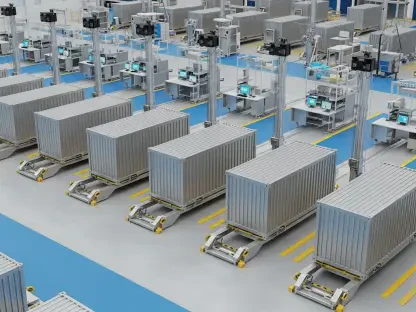In a world where aviation contributes significantly to global carbon emissions, the race to find sustainable solutions has never been more urgent, and a University of Oxford spin-out named OXCCU might just have the breakthrough the industry desperately needs. With a recently secured $28 million in an oversubscribed Series B funding round, this innovative company is poised to scale up the production of sustainable aviation fuel (SAF) derived from waste carbon. At a time when regulatory pressures are mounting and net zero targets are looming on the horizon, the aviation sector is hungry for cost-effective, scalable alternatives to traditional fossil fuels. OXCCU’s approach, which promises to slash production costs through a unique one-step process, could be a game-changer. Backed by a powerhouse of investors from aviation, energy, and climate sectors, the funding signals not just financial support but a collective belief in the transformative potential of this technology. As the company moves toward commercialization with demonstration plants already in progress, the implications extend beyond aviation, hinting at broader decarbonization impacts. This development marks a critical juncture for an industry under scrutiny, setting the stage for a deeper exploration of how OXCCU could reshape the future of sustainable fuel.
The Urgency of Decarbonizing Aviation
Regulatory Push and Industry Commitments
Aviation stands at a crossroads as global efforts to combat climate change intensify, with regulatory frameworks like the UK SAF mandate and ReFuelEU Aviation initiative pushing for a rapid transition to greener fuels. These policies are not mere suggestions but binding targets that compel airlines and fuel producers to integrate sustainable options at an unprecedented pace. Major industry players, such as International Airlines Group (IAG), have publicly committed to ambitious goals, targeting net zero emissions by 2050 and ensuring that 10% of their fuel supply comes from SAF by 2030. Such commitments reflect a broader industry acknowledgment that decarbonization is no longer optional but a fundamental requirement for long-term viability. OXCCU’s emergence with a potential solution arrives at a pivotal moment, aligning perfectly with this heightened sense of urgency and offering a tangible path to meet these stringent mandates.
The pressure to decarbonize is further compounded by public and investor expectations, which demand transparency and accountability in environmental impact. Airlines face the dual challenge of maintaining operational efficiency while navigating the complexities of adopting new fuel technologies. Failure to adapt risks not only regulatory penalties but also reputational damage in an era where sustainability is a key differentiator. OXCCU’s technology, by focusing on affordability and scalability, addresses a critical pain point, potentially easing the transition for airlines under strain. This alignment with both policy and market dynamics positions the company as a vital contributor to aviation’s green transformation, capturing the attention of stakeholders eager for actionable progress.
Global Stakes and Environmental Imperatives
Beyond regulations, the environmental stakes for aviation decarbonization are staggering, as the sector accounts for a significant share of global greenhouse gas emissions. With air travel demand projected to grow in the coming decades, the challenge of balancing expansion with sustainability becomes even more daunting. Solutions like electric or hydrogen-powered aircraft remain distant for long-haul flights, making SAF the most viable near-term option for cutting emissions. OXCCU’s entry into this space with a novel approach to fuel production offers a beacon of hope, addressing the urgent need for alternatives that can be deployed at scale without compromising on performance or safety standards.
Moreover, the ripple effects of aviation’s carbon footprint extend to global climate goals, where every sector must contribute to limiting temperature rise. The technology developed by OXCCU, which converts waste carbon into jet fuel, not only reduces reliance on fossil resources but also tackles waste management challenges by repurposing carbon emissions. This dual benefit amplifies the environmental imperative of supporting such innovations. As governments and international bodies tighten emissions caps, the aviation industry must pivot swiftly, and companies like OXCCU could provide the critical tools needed to align with broader climate objectives, ensuring the sector plays its part in a sustainable future.
Breaking the Cost Barrier
Addressing SAF’s Biggest Challenge
One of the most formidable obstacles to the widespread adoption of sustainable aviation fuel has always been its prohibitively high production cost, a hurdle that has kept SAF from becoming a mainstream alternative to conventional jet fuel. Traditional methods often involve multiple energy-intensive steps, driving up expenses and making it difficult for airlines to justify the switch on economic grounds. OXCCU is directly confronting this challenge with a technology designed to streamline the production process, significantly reducing both capital and operating expenditures. CEO Andrew Symes has emphasized that making SAF affordable is at the core of their mission, a perspective that resonates deeply with an industry struggling to balance sustainability with profitability.
The economic implications of this innovation are profound, as cost has long been the Achilles’ heel of SAF integration, often rendering it a niche solution rather than a universal standard. Investors backing OXCCU have echoed this sentiment, highlighting that lowering production costs could unlock a tipping point where SAF becomes competitive with fossil fuels. This shift would not only encourage broader adoption but also stimulate market demand, creating a virtuous cycle of investment and deployment. By focusing on efficiency, OXCCU is tackling the financial barriers head-on, potentially paving the way for a seismic shift in how aviation fuel is sourced and utilized across the globe.
Economic Viability and Market Transformation
Achieving economic viability for SAF is not just about cutting costs but also about creating a sustainable business model that can thrive in a competitive energy landscape. OXCCU’s approach, which simplifies the conversion of waste carbon into jet fuel, offers a pathway to scale production without the hefty price tag associated with older methods. This could fundamentally alter the market dynamics, making SAF an attractive option for airlines that have previously shied away due to budget constraints. The potential to produce fuel at a lower cost also aligns with the growing regulatory incentives that reward carbon reductions, creating a financial framework where sustainability and profitability can coexist.
Furthermore, the ripple effects of cost reduction extend beyond individual airlines to the entire supply chain, influencing fuel producers, airports, and even policy frameworks. A more affordable SAF could accelerate the development of infrastructure needed for distribution and storage, addressing another critical bottleneck in adoption. OXCCU’s focus on cost efficiency might also inspire further innovation in the sector, spurring competitors to refine their processes or develop complementary technologies. As the market transforms, the company’s role as a catalyst for change becomes evident, potentially redefining the economics of aviation fuel and setting a new benchmark for what sustainable solutions can achieve in a cost-conscious industry.
Technology as the Game-Changer
Innovation Behind OXCCU’s Process
At the core of OXCCU’s promise lies a groundbreaking technological innovation—a patented iron-based catalyst that enables the direct conversion of waste carbon into jet fuel in a single exothermic reaction. Unlike conventional SAF production, which often requires multiple intermediary steps such as reverse water gas shift or e-methanol synthesis, this one-step process eliminates unnecessary complexity, slashing both energy use and associated costs. The result is a fuel with a lower carbon intensity, aligning with environmental goals while maintaining the performance standards required for aviation. This streamlined approach represents a significant departure from traditional methods, positioning OXCCU as a frontrunner in the quest for practical decarbonization solutions.
The versatility of the catalyst further enhances its appeal, as it can process a range of feedstocks including reformed biogas, gasified wood waste, and even pure carbon dioxide paired with hydrogen. This adaptability ensures that the technology can be deployed across diverse regions and industries, mitigating dependency on specific raw materials and enhancing commercial feasibility. By reducing the carbon footprint of the production process itself, OXCCU’s innovation addresses not just the end-use emissions but the entire lifecycle impact of aviation fuel. Such a holistic approach to sustainability underscores the transformative potential of this technology, offering a blueprint for how science can directly tackle real-world challenges in energy production.
Scalability and Real-World Application
Scaling a laboratory innovation into a commercially viable product is often where many promising technologies falter, but OXCCU appears poised to bridge this gap with strategic use of its recent funding. The company has already launched its OX1 demonstration plant at London Oxford Airport in 2024, a critical step in proving the technology’s effectiveness outside controlled environments. Plans for the OX2 plant, expected to be fully operational by 2026, signal an aggressive push toward larger-scale production, providing valuable data on performance and reliability under real-world conditions. These milestones are essential for gaining the trust of airlines and regulators, who require robust evidence before committing to new fuel sources.
Beyond the immediate focus on demonstration plants, the broader application of OXCCU’s technology hints at its scalability across global markets. The ability to utilize waste carbon as a feedstock means that production facilities could be established near industrial hubs or waste processing centers, reducing transportation costs and further enhancing sustainability. This practical approach to deployment could accelerate the integration of SAF into existing aviation infrastructure, minimizing the need for extensive retrofitting or investment. As OXCCU moves toward full commercialization, the emphasis on real-world applicability will likely determine how quickly and effectively this technology can influence the aviation sector, potentially setting a precedent for other industries seeking carbon-neutral solutions.
Strategic Partnerships and Market Impact
Investor Confidence and Collaborative Power
The $28 million Series B funding round for OXCCU drew an impressive array of investors, spanning aviation giants like IAG Ventures and Safran Corporate Ventures to energy leaders such as ORLEN VC, alongside returning backers like Clean Energy Ventures and IP Group/Kiko Ventures. This diverse coalition reflects not just financial support but a shared conviction in the technology’s ability to address critical sustainability challenges. Each investor brings unique expertise—IAG with its deep aviation insights, Safran with high-tech innovation, and ORLEN with ambitions to lead SAF production in Europe by 2035. Their collective involvement underscores a growing trend of collaboration between startups and established players, a model increasingly seen as vital for navigating the complexities of climate tech development.
This strategic alignment goes beyond mere capital infusion, as it fosters a network of knowledge and resources that can de-risk the path to market for OXCCU’s innovation. Aviation and energy companies have the operational experience to guide practical implementation, while climate-focused funds offer insights into regulatory and environmental priorities. Such partnerships could accelerate the adoption of SAF by integrating it into existing supply chains and operational frameworks, reducing the friction of transitioning to new fuels. The collaborative power behind OXCCU signals a broader industry shift toward unified efforts, where solving decarbonization challenges becomes a shared responsibility rather than a solitary pursuit.
Shaping the Future of Aviation Fuel Markets
The market impact of OXCCU’s funding and technology extends far beyond individual partnerships, potentially redefining the competitive landscape of aviation fuel. By introducing a cost-effective SAF production method, the company could catalyze a shift in how fuel is valued and prioritized, moving away from fossil-based dominance toward sustainable alternatives. This transformation is particularly significant given the regulatory tailwinds pushing for greener fuels, which create a fertile ground for innovations like OXCCU’s to gain traction. If successful at scale, this technology might pressure traditional fuel suppliers to adapt or risk obsolescence, fundamentally altering market dynamics over the coming years.
Additionally, the involvement of major industry players in OXCCU’s funding round sends a powerful signal to the market about the viability and urgency of SAF solutions. It encourages other investors and companies to explore similar ventures, potentially sparking a wave of innovation and investment in the sector. The broader implications include the possibility of creating a more resilient and diversified fuel market, where sustainability becomes a core driver of value. As OXCCU progresses with its demonstration plants and commercialization efforts, its influence on market trends could set new standards for what constitutes a viable aviation fuel, pushing the industry closer to a carbon-neutral future through strategic collaboration and technological advancement.
Broader Horizons for Decarbonization
Applications Beyond Aviation
While the primary focus of OXCCU’s technology lies in transforming aviation fuel, its potential applications extend into other carbon-intensive sectors such as chemicals and plastics, opening up new avenues for decarbonization. The ability to convert waste carbon into valuable products using a single-step process could address sustainability challenges in industries that struggle with high emissions and limited green alternatives. This versatility enhances the strategic importance of the recent funding, as it positions OXCCU as a multi-industry player capable of contributing to global climate goals across diverse domains. Such broad applicability amplifies the technology’s appeal to investors seeking impactful solutions with wide-reaching effects.
Exploring these additional applications also mitigates risks associated with focusing solely on aviation, a sector subject to fluctuating demand and regulatory shifts. By diversifying potential markets, OXCCU can build resilience into its business model, ensuring long-term relevance even if aviation adoption faces delays. The prospect of decarbonizing chemicals and plastics production, which often rely on fossil-derived inputs, adds another layer of environmental benefit, reducing overall carbon footprints in unexpected areas. This expansive vision highlights how a single innovation can ripple through multiple sectors, creating systemic change in how resources are utilized and waste is managed on a global scale.
Reflecting on a Sustainable Legacy
Looking back, OXCCU’s achievement in securing $28 million through an oversubscribed Series B round stood as a defining moment in the pursuit of sustainable aviation fuel. The company’s novel approach to converting waste carbon into jet fuel tackled a persistent barrier—cost—that had long hindered SAF’s widespread use. Supported by a formidable alliance of industry leaders and climate investors, OXCCU gained the momentum needed to scale operations, with projects like the OX1 and OX2 demonstration plants marking tangible progress. This milestone not only spotlighted the potential for aviation decarbonization but also showcased the strength of collaborative innovation in addressing climate challenges. Moving forward, the focus should shift to accelerating the integration of such technologies into global fuel supply chains, ensuring that regulatory frameworks continue to incentivize adoption. Additionally, exploring partnerships to adapt this technology for other industries could maximize its environmental impact, offering a scalable model for sustainability. OXCCU’s journey serves as a reminder that strategic investment and bold innovation can converge to build a lasting legacy for a cleaner, greener future.









